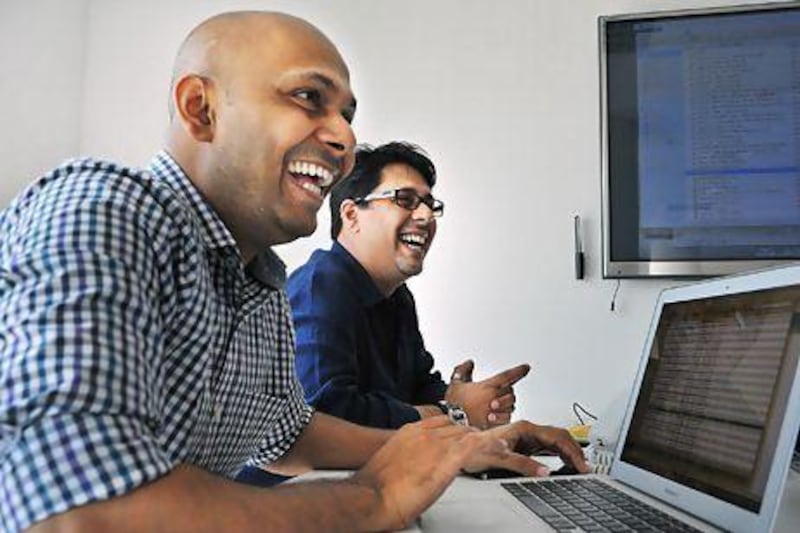It's a high-risk strategy to tell a prospective client that its approach to improving its website is wrong. And it is especially risky when you are a start-up and the more established agencies you are competing against have gone ahead and submitted their own proposals.
But for Amol Kadam and Devesh Mistry, the founders of RBBi digital marketing agency, being clear with their clients is paramount. In fact the name of the agency is derived from the red-blue blur associated with Superman; they wanted to associate themselves with standing up for what they believe in, just like superheroes do.
With regard to their own leap in the dark, their boldness paid off and they won the contract - "we like to call that incident a leap of faith," Mr Mistry says. "But our hearts were pounding at the time."
The pair told the client, a property group, it wasn't asking the right questions - reflecting the typical pattern of what they say often happens in this region; the firm hadn't done any research to understand what was wrong with the current website; it hadn't done any research on how the site would mesh with the day-to-day running of the business; and it hadn't understood from its users what they wanted from a property website.
The pair interviewed everyone at the property group from the chief executive to call centre workers to find out what their expectations of the site were. Then they surveyed different users to understand what was good about the site and what they wanted. After the research they did a redesign based on their findings. These included swapping the word "lease" for "rent" because it's what users prefer, making the property search process simpler, and linking the call centre to the online query system.
Since the redesign, the average of 25 or 30 leads a day from the website has almost double to 50 leads a day. "Whatever we do, we follow a certain process," Mr Kadam explains. "The time is a little longer, the cost is a little higher and that's where the problem comes in." They also differ from other digital marketing agencies in that they focus on user experience and user interface - two things they consider crucial but which they found many local companies don't understand because the industry is still relatively young in the Middle East. Take the example of buying something online, they say, user interface is about navigating the site to complete the transaction; user experience is about what it's like to phone the call centre if something goes wrong, as well as the speed with which the order is delivered in addition to the using the site.
RBBi spends a lot of time educating its clients, helping them to understand why paying for user experience research will boost profits in the long run.
Mr Kadam points out that a client, the Ritz Carlton-Marriott hotel chain, spent US$2 million on worldwide research before redesigning its website. But the chief executive was willing to pay for this because expected a revamped site to boost turnover by 20 per cent, or $20 million.
The pair can reel off numerous examples of how their work boost profits directly or indirectly, or reinforces the brand. Another is how after they were called in to do a userability analysis of Sky News Arabia's new website, they succeeded in boosting page view by 38 per cent.
As the only agency in the region that specialises in user interface analysis, another risk the pair took was refusing to take on this work subcontracted from other agencies without getting the due acknowledgement for it. They reckon this probably lost them some business in the short term but has paid off in the long term as their reputation has solidified.
In fact, RBBi made a profit in its first year, exceeding their business plan projections.
As well as getting ready to move offices within Dubai's Jumeirah Lakes Towers, their current location is getting a little tight now the number of employees has grown to 16, RBBi is also working on the launch in December of a social networking site for children in the Arab world. This is after the Worldoo social network they created for children in India has proved a phenomenal success with 35,000 signing up in five months.
Looking ahead, RBBi expects to get more work outside of the UAE.
"Now the next next steps for us there is a lot of demand coming in from Saudi, Bahrain," Mr Kadam says. "After the economic meltdown quite a few people are moving into this region and they have heard about these terms. [They understand] that user experience is the biggest thing."





